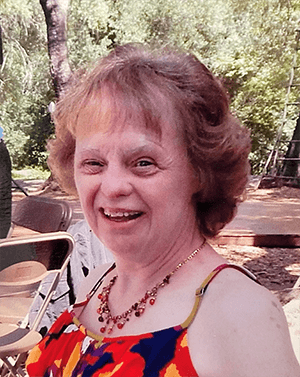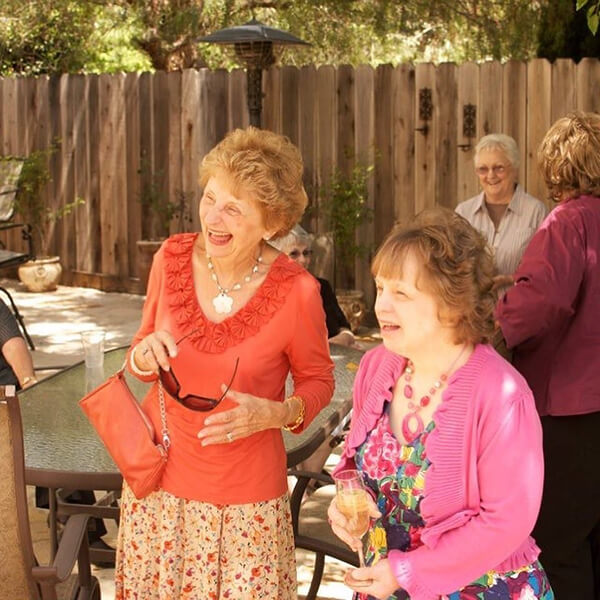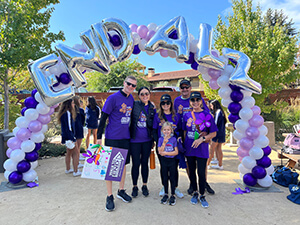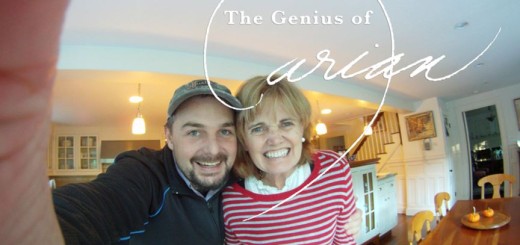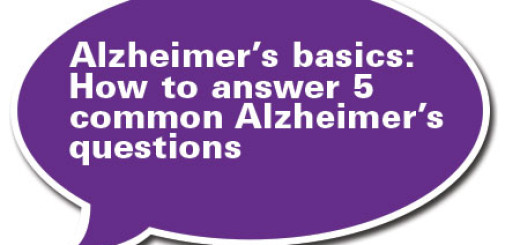Napa Valley resident honors sister who had dementia and Down syndrome
When Greg’s sister Sheri was diagnosed with Alzheimer’s disease, he and his wife Patti, didn’t have any experience with the disease. They were both surprised to learn how common it was in people who have Down syndrome. Three years later, after Sheri’s death, they wanted to help find a way to end this disease. Through their company, Long Electric, they became sponsors for Walk to End Alzheimer’s – Napa Valley and encourage others to attend this inspiring event.
Silver medal recipient
Sheri loved to read, watch television, go on walks and dance. She worked at the same job for 17 years and loved her routine. In her twenties Sheri participated in the Special Olympics at the University of Southern California where she received a silver medal.
Sheri also had Down syndrome, but to Greg, her younger brother, and the rest of the family, she was just Sheri. “All their friends treated her just like, ‘Oh it’s Sheri,’” said Greg’s wife, Patti, who has known Sheri since they were all teenagers. “As we got older and had kids, no one treated her different, they didn’t even ask [about the Down syndrome]. Everyone treated her the same, it was so cute.”
Because of the Down syndrome, Sheri continued to live with her parents in their family home. On Saturday mornings Sheri and her mom, Winnie, would walk around the grocery store in matching outfits, drinking coffee and talking with everyone at the store. “They were like two little twins,” said Patti. “It was so funny. We still smile when we think of them, they were both very special people.”
A break in routine
Sheri liked to do the same thing every day. Structure and routine were very important to her. “She had chores to do in the house like vacuum on the weekends,” said Greg. “If you got in the way she wasn’t happy.”
Winnie first started noticing that Sheri would lose things like her keys or her purse. Sheri, who worked on an assembly line putting together pet supplies, stopped being able to follow instructions at work. At the time, Patti, Greg and the rest of the family didn’t think too much about it.
One day, Sheri had had a seizure and collapsed. Understandably panicked, Winnie called Greg for help. They took Sheri to the emergency room. “That was when Mom started telling us [Sheri] was having problems,” said Patti. “She was having accidents and she’d get scared at the store and take off running out the front door.”
Living at home
After the visit to the emergency room, tests were run, and it became clear that Sheri, at the age of 57, had young-onset Alzheimer’s. Those affected by Down syndrome have a greater risk of developing a type of dementia that’s either the same as or very similar to Alzheimer’s disease.
According to the National Down Syndrome Society, about 30% of people with Down syndrome who are in their 50s have Alzheimer’s dementia. About 50% of people with Down syndrome in their 60s have Alzheimer’s dementia.
At first, Sheri continued to live with Winnie, attending an adult day program for people living with dementia. However, as the disease progressed, Sheri could no longer attend the program and would remain at home. The family recognized that Winnie couldn’t care for herself and her daughter, prompting them to hire in home care during the day. At night, Patti, Greg and other family members would spend the night to ensure everyone’s safety.
“Sheri had gotten to the point where she couldn’t go to the day program anymore and they recommended we might need to get some help,” said Patti. “Greg’s mom was looking exhausted and had lost quite a bit of weight and she finally said that she couldn’t do it and needed help. This was when we hired help to come to their house during the day until we could get there after work”
An unexpected diagnosis
Sadly, it was also during this time that Winnie was diagnosed with pancreatic cancer and given three months to live. “That escalated the urgency of finding a good place for Sheri as we knew what we were doing wasn’t sustainable,” said Patti. “Greg’s mom also wanted the peace of mind knowing that [Sheri] was in a good place.”
Patti and Greg began looking for a care setting that Sheri would be able to live at but couldn’t find ones they liked, specifically because she was so young. In Greg and Patti’s opinion, she was no longer a person with Down syndrome, she was a person with Alzheimer’s disease.
They found a small care setting in Napa but they had never had a resident with Down syndrome before, and wanted to meet Sheri. “They met her and within 10 minutes they said, ‘We’ll take her,’” said Greg. “They were really good with Sheri. She was in good hands and everybody was helpful and they all cared about her very much, we were lucky.”
The care setting was within five minutes of Greg and Patti’s home and they were able to help set up Sheri’s personal things in her room. “We remembered Sheri’s first night at [the care setting], she had never lived anywhere but at home with her family,” said Patti. “It was so hard to leave her. That night at bedtime, the doctor, FaceTimed us with Sheri all tucked in so that we could say good night to her and see that she was ok.”
Shortly before Winnie died from cancer, she was able to visit Sheri at the care setting. “Mom got out of the hospital and got to see her there,” said Greg. “[Mom] felt good that Sheri was comfortable at the place she was at.”
Sheri died three years after her initial diagnosis at the age of 60.
Participating in Walk
Since Sheri’s death, Patti and Greg heard about Walk to End Alzheimer’s – Napa Valley. The Alzheimer’s Association Walk to End Alzheimer’s® is the world’s largest fundraiser for Alzheimer’s care, support and research. This inspiring event calls on participants of all ages and abilities to join the fight against the disease.
The first year, Patti went to Walk on her own but was so inspired by the event that she encouraged the rest of her family to attend the following year. “Once you get to the event and listen to the stories it hooks you,” said Patti. “Every year we’ve gone, we see more people that we know. We saw some friends and their mom has it. It keeps you coming back. It’s so important to talk about, and hopefully one day find a cure.
“Before Sheri we didn’t know anybody who had had it, you don’t know what to do and look for. It’s good to talk about it. [The disease is] so draining emotionally. [When you’re at Walk] you feel recharged. You don’t feel so alone in what you’ve gone through.
“We didn’t start going [to Walk] until after [Sheri died]. It felt replenishing and hopeful and you want to hear that there’s new things happening. [When] my daughter in law [came with us, she] looked at me and said, ‘Oh I get it now. I get why you’re hooked.’”
Becoming a sponsor
Greg and Patti were so committed to the cause that they decided to have their company, Long Electric, become a sponsor for Walk in Napa Valley. Local sponsors of Walk to End Alzheimer’s have a unique opportunity to impact the success of the event while displaying commitment to the local community.
“We wanted to be involved in something like this and we chose the Alzheimer’s Association®,” said Greg. “We’re confident the money is going to help find the cure or treatment to make [this disease] better. Everybody knows somebody who has [the disease] or had it. It’s something that affected us and we’d like to help.”
Sponsors are encouraged to take their commitment one step further by organizing a team to walk and raise awareness, and Patti and Greg have done this as well. “We’re committed to the cause,” said Patti. “In our hearts we want to do this. We want to do this for Sheri. [Greg’s] mom would have wanted us to do something like this.”
Reach out for help
Patti and Greg encourage other caregivers to reach out for support and education on the disease. Resources can be found on alz.org or by calling the Alzheimer’s Association 24/7 Helpline at 800.272.3900. “The first thing you should do is reach out,” said Greg. “You gotta have help. This is too big a task for any one person.”
When Greg and Patti began their Alzheimer’s journey, they didn’t know much about the disease. However, by the time Sheri died, an employee of theirs had also been diagnosed. As time goes on, they’re hearing about it more and more.
“One minute we didn’t have experience and next thing we had two,” said Greg. “It just felt like, wow this is something we would like to be involved in in some way. It’s such a heart-breaking disease and so many people are affected by it now. We have to find a way to fix that.”
Join Greg and Patti’s team, Long Electric, or start your own for the Walk to End Alzheimer’s – Napa Valley on September 7, 2024 in Yountville Park. Not in Napa Valley? Find a walk near you at alz.org/walk.
Interested in becoming a sponsor? Contact your local Walk to find out how you can be a part of this amazing event.





